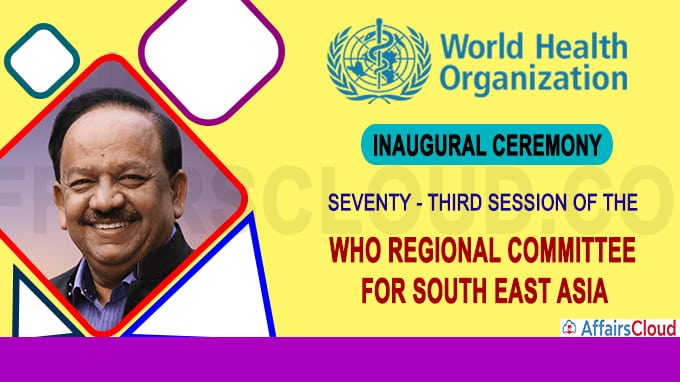 On September 9-10, 2020, the 73rd session of WHO (World Health Organization) South East Asia Region (SEAR) was hosted virtually by Thailand from Bangkok under the Chairmanship of Mr. Anutin Charnvirakul, Deputy Prime Minister and Minister of Health, Thailand where Indian side was represented by Union Minister Dr. Harsh Vardhan, Minister for Health and Family Welfare (MoHFW) along with Sh. Ashwini Kumar Choubey, Minister of State for Health and Family Welfare. Dr. Poonam Khetrapal Singh, Director WHO SEAR.
On September 9-10, 2020, the 73rd session of WHO (World Health Organization) South East Asia Region (SEAR) was hosted virtually by Thailand from Bangkok under the Chairmanship of Mr. Anutin Charnvirakul, Deputy Prime Minister and Minister of Health, Thailand where Indian side was represented by Union Minister Dr. Harsh Vardhan, Minister for Health and Family Welfare (MoHFW) along with Sh. Ashwini Kumar Choubey, Minister of State for Health and Family Welfare. Dr. Poonam Khetrapal Singh, Director WHO SEAR.
- Union Minister Dr. Harsh Vardhan, who was the Chair of the 72nd SEAR session which held in New Delhi ,addressed his part before handover the handing over the charge to the new Chair Mr. Anutin Charnvirakul
- This was for the first time that the entire event was held virtually due to COVID pandemic to discuss most pressing regional and global public health issues.
Dr. Harsh Vardhan addresses the Ministerial Round Table Session on COVID-19 Emergency Preparedness
Dr. Harsh Vardhan provided two interventions in the Ministerial Round Table Session on COVID-19 Emergency Preparation.
- First one – Three important interventions that were applied to manage COVID – 19 and maintain essential non – COVID health services in India.
- Second one – He shared the strategies applied to ensure that there are increased investments in health and health emergency preparedness and response as well as in International Health Regulation core capacities to prevent future pandemics.
SEAR Member States’ Declaration on the collective response to COVID-19 in South-East Asia Region
During the second and last day of the 73rd Regional Committee Session ,the declaration was signed at the end of a ministerial round table.
- All member countries shared their various COVID-19 response measures and efforts being made to maintain essential health services and restore those impacted due to the pandemic.
- Member countries agreed to continuing and expanding multi-sectoral collaboration; strengthening regional collaboration for scaling up capacities for preparedness, surveillance and rapid response, field epidemiology training, supply chain management of medicines and medical supplies, and regional stockpiling of essential health resources. They also resolved to identify gaps and strengthen core capacities as required by the International Health Regulations 2005.
Efforts taken by India in Health Sector Highlighted in Session
-National Health Policy 2017, which aims to provide affordable healthcare for all citizens of India.
-Ayushman Bharat which launched in 2018 marks a significant milestone towards universal health coverage and is also the world’s largest government-sponsored free healthcare assurance program.
-Elimination of Poliomyelitis, Maternal and Neonatal Tetanus and Yaws as well as considerable reductions in maternal and newborn mortality
-India’s target of elimination of Tuberculosis by 2025, and commitment to eliminate neglected tropical diseases like lymphatic filariasis and kala-azar.
-Launching of Swachh Bharat Abhiyaan, Housing for All by 2022, Nutrition Mission, Skill Development, Smart Cities, Eat Right India, Fit India etc. to elevate the quality of life of Indians.
Recent Related News:
On July 22, 2020 The World Health Organization (WHO) along with other key bodies had launched COVID-19 Law Lab(www.COVIDLawLab.org). It is a database of laws that countries had implemented in response to the COVID-19 pandemic. The lab is a joint project of the United Nations Development Programme (UNDP), WHO, the Joint United Nations Programme on HIV/AIDS (UNAIDS) and the O’Neill Institute for National and Global Health Law at Georgetown University.
About WHO South East Asia Region (SEAR):
Headquarter– New Delhi
Members– 11 nations: Bangladesh, Bhutan, Korea, India, Indonesia, Maldives, Myanmar, Nepal, Sri Lanka, Thailand, and Timor-Leste




